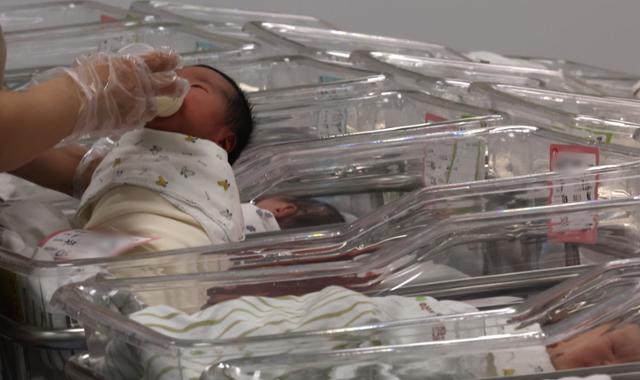
A nurse takes care of newborns at a hospital in Incheon on Feb. 26. Newsis
By KTimes
Despite a slight rebound in South Korea's total fertility rate last year, young people overwhelmingly associate marriage and childbirth with negative emotions such as sadness, fear and disgust.
The Korean Peninsula Population Institute for Future (KPPIF), a non-profit population policy research institute, analyzed approximately 50,000 posts related to marriage, childbirth and parenting on the workplace community platform Blind. The findings, released Tuesday, highlight the prevailing negative perceptions toward the topics among young people. The analysis examined posts from December 2017 to Nov. 2, 2024, using frequency, topic, network and sentiment analysis to gain insights into young people's perspectives, the institute said.
According to the sentiment analysis, more than 60 percent of posts on marriage, childbirth and parenting expressed negative emotions. Among marriage-related posts, sadness was the most dominant emotion expressed at 32.3 percent, followed by fear at 24.6 percent and disgust at 10.2 percent. In total, 67.1 percent of marriage-related posts reflected negative sentiment.
Childbirth-related posts followed a similar pattern, with disgust being the most frequently expressed emotion at 23.8 percent, followed by fear at 21.3 percent and sadness at 15.3 percent. Parenting-related posts also showed sadness as the most common emotion at 32 percent, with fear and disgust accounting for 23.2 percent and 13.4 percent, respectively.
In contrast, posts categorized as expressing happiness were significantly lower, making up 9.3 percent for marriage, 7.4 percent for childbirth and 13.1 percent for parenting. The findings indicate that negative perceptions among young people are deeply entrenched.
Keyword analysis revealed that the word "money" appeared most frequently in marriage-related posts at 28.9 percent and ranked fifth in childbirth-related posts at 13.2 percent. The keyword "house" was commonly found in 18.7 percent of parenting and 29 percent of parental leave discussions.
Topic analysis of parenting-related posts showed that 69.6 percent focused on "the raising of children and parental roles within the household," while 30.4 percent addressed "workplace child care support policies and career management." Among parental leave-related posts, 37.8 percent discussed "the raising of children and the division of family roles," 24.4 percent focused on "balancing work and parenting," and 19.6 percent highlighted "practical and social issues surrounding parental leave." The institute said these findings suggest that the actual challenges in using parental leave pose a greater obstacle despite the existence of such policies.
The findings contrast with recent fertility rate statistics. KPPIF pointed out that "the total fertility rate of 0.75 announced by Statistics Korea for 2024 shows only a minimal increase and is likely a temporary recovery due to delayed marriages and childbirths caused by the pandemic." The institute emphasized the importance of policy efforts to address shifting perceptions among young people and sustain an upward trend in the fertility rate. According to Statistics Korea’s report on Feb. 26, last year’s total fertility rate of 0.75 marked a 0.03 increase from the previous year, the first uptick in nine years.
"Despite the statistical rebound in birth rates, young people’s perceptions of marriage, childbirth and parenting remain overwhelmingly negative," said Yoo Hye-jung, director of the population research center at KPPIF. She urged companies to focus on fostering a family-friendly work environment and promoting parental leave while calling on the government to prioritize housing stability and expand tangible child care support measures.
This article from the Hankook Ilbo, the sister publication of The Korea Times, is translated by a generative AI system and edited by The Korea Times.


















 English (United States) ·
English (United States) ·